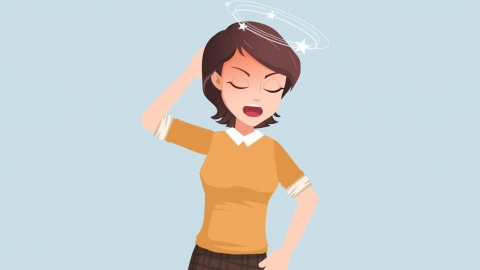What causes dizziness when lying down or getting up?
Generally, dizziness upon lying down or standing up may be caused by changes in posture, excessive fatigue, dehydration, vestibular neuritis, cervical spondylosis, and other factors. It is recommended to seek timely medical consultation to determine the exact cause and receive appropriate treatment. Detailed explanations are as follows:

1. Postural Changes
Dizziness after lying down or standing up might be a normal physiological phenomenon caused by transient cerebral hypoperfusion due to postural change, which may lead to a sensation of dizziness. Usually, no specific treatment is required. It is recommended to relieve symptoms by changing posture slowly and getting appropriate rest.
2. Excessive Fatigue
Excessive fatigue may lead to physical weakness and lowered blood pressure, which may cause dizziness during postural changes. Symptoms may include listlessness, fatigue, and difficulty concentrating. It is recommended to rest adequately, ensure sufficient sleep, and avoid overexertion.
3. Dehydration
Insufficient body water, especially in hot weather or after strenuous exercise, may cause dehydration. Dehydration increases blood viscosity and reduces the circulatory system's efficiency in redistributing blood flow. Particularly when changing from a lying to a standing position, cerebral blood supply may temporarily decrease, causing dizziness. Symptoms may also include thirst, dark yellow urine, and fatigue. It is recommended to develop a habit of drinking water regularly rather than waiting until thirsty.
4. Vestibular Neuritis
Vestibular neuritis is an inflammation of the vestibular nerve caused by a viral infection. After a viral infection, an immune response may be triggered, leading to dysfunction of the vestibular nerve and resulting symptoms. The dizziness lasts for a prolonged period and is often accompanied by nausea and vomiting. It is recommended to take medications such as ganciclovir capsules, dexamethasone acetate tablets, and metoclopramide tablets under a doctor's guidance.
5. Cervical Spondylosis
Cervical spondylosis may be caused by improper sleeping posture, excessive neck movement, and other factors. Herniated cervical discs and bone spurs may compress the vertebral artery, leading to insufficient cerebral blood supply. During lying down and getting up, postural changes may exacerbate the compression, causing dizziness, possibly accompanied by neck stiffness, pain, and back pain. It is recommended to take medications such as chlorzoxazone tablets, eperisone hydrochloride tablets, and sodium naproxen tablets under a doctor's guidance.
It is recommended to maintain sufficient and regular sleep to allow the body to rest fully. Additionally, engaging in mild exercises such as walking and yoga may help improve the body's balance and endurance.





